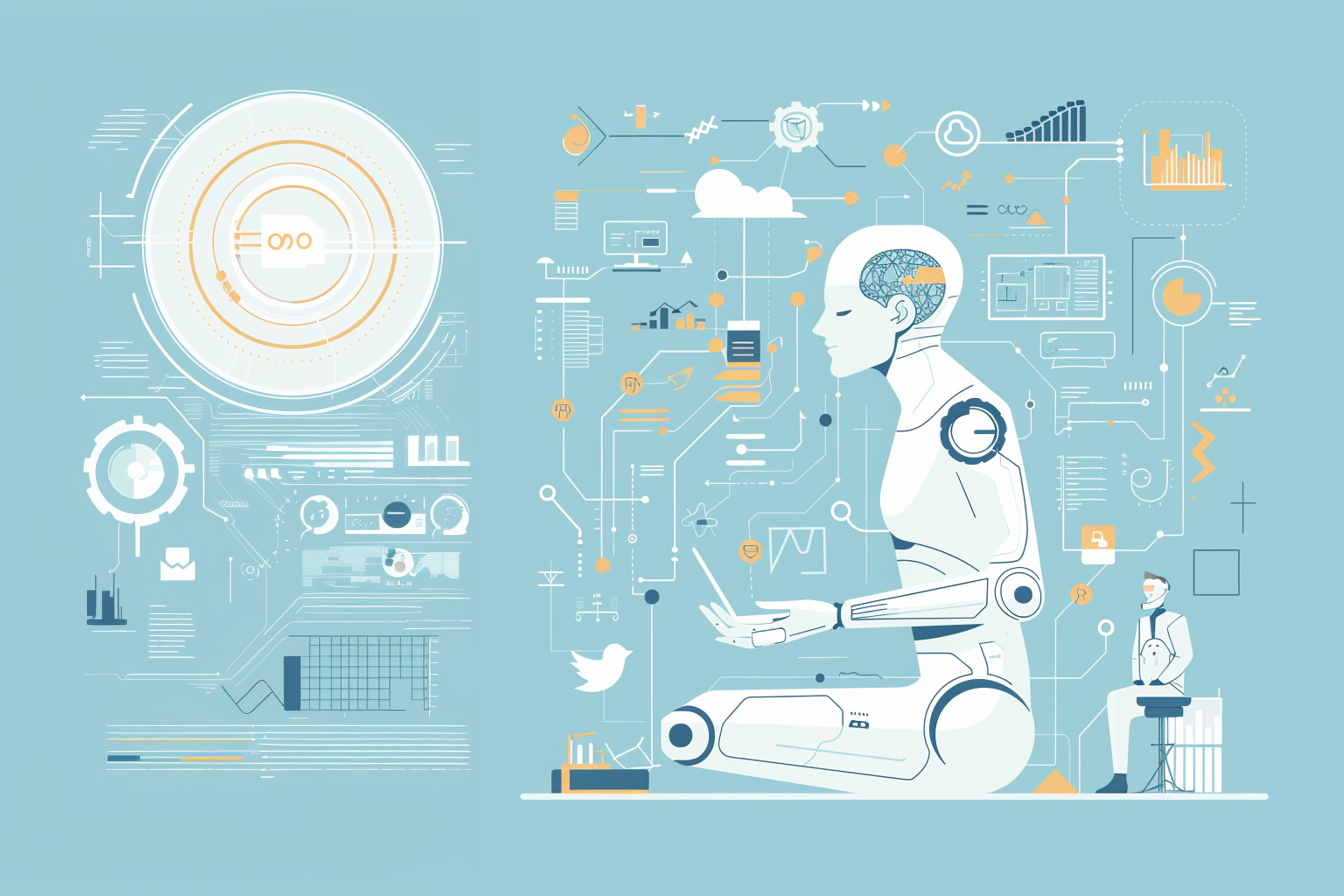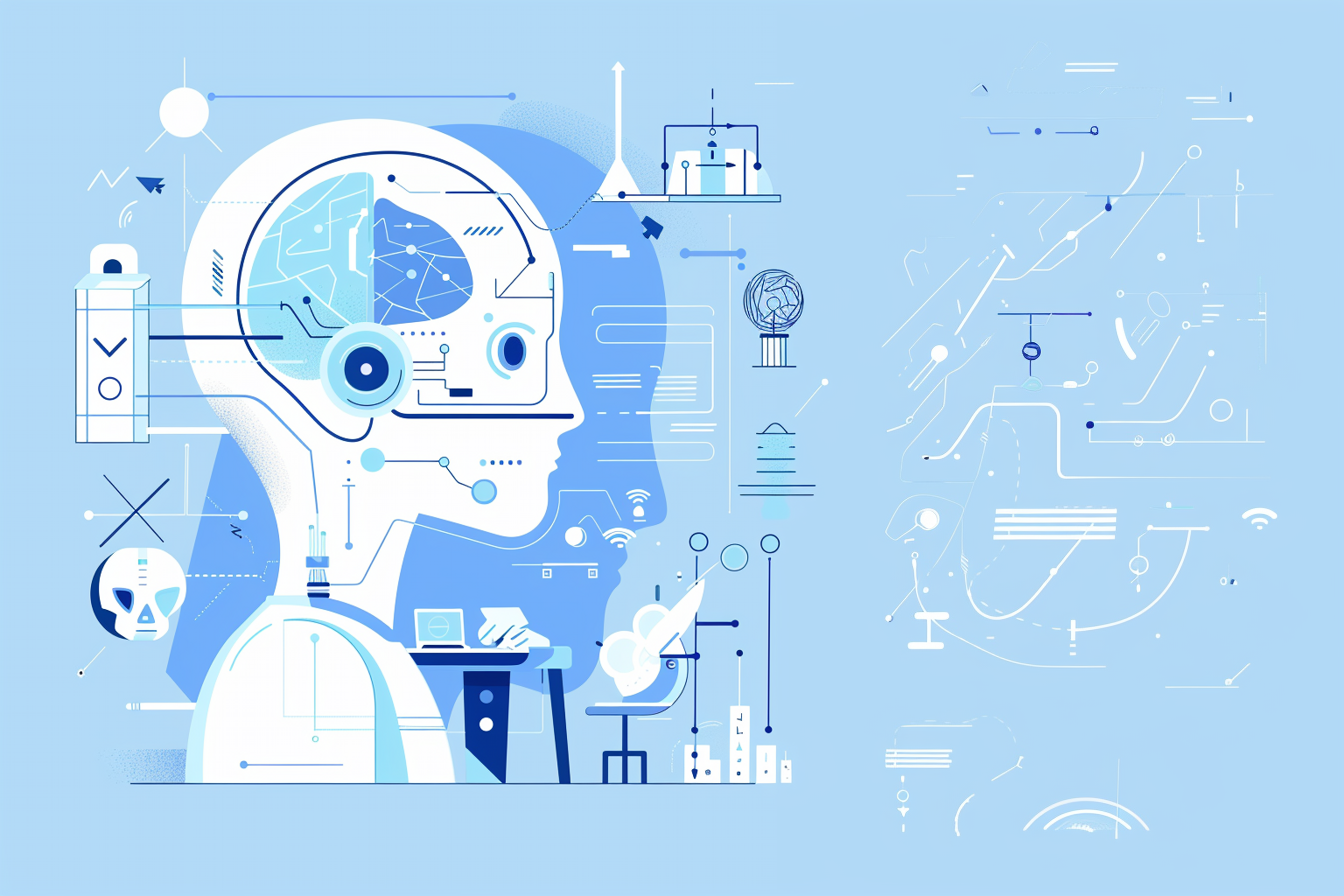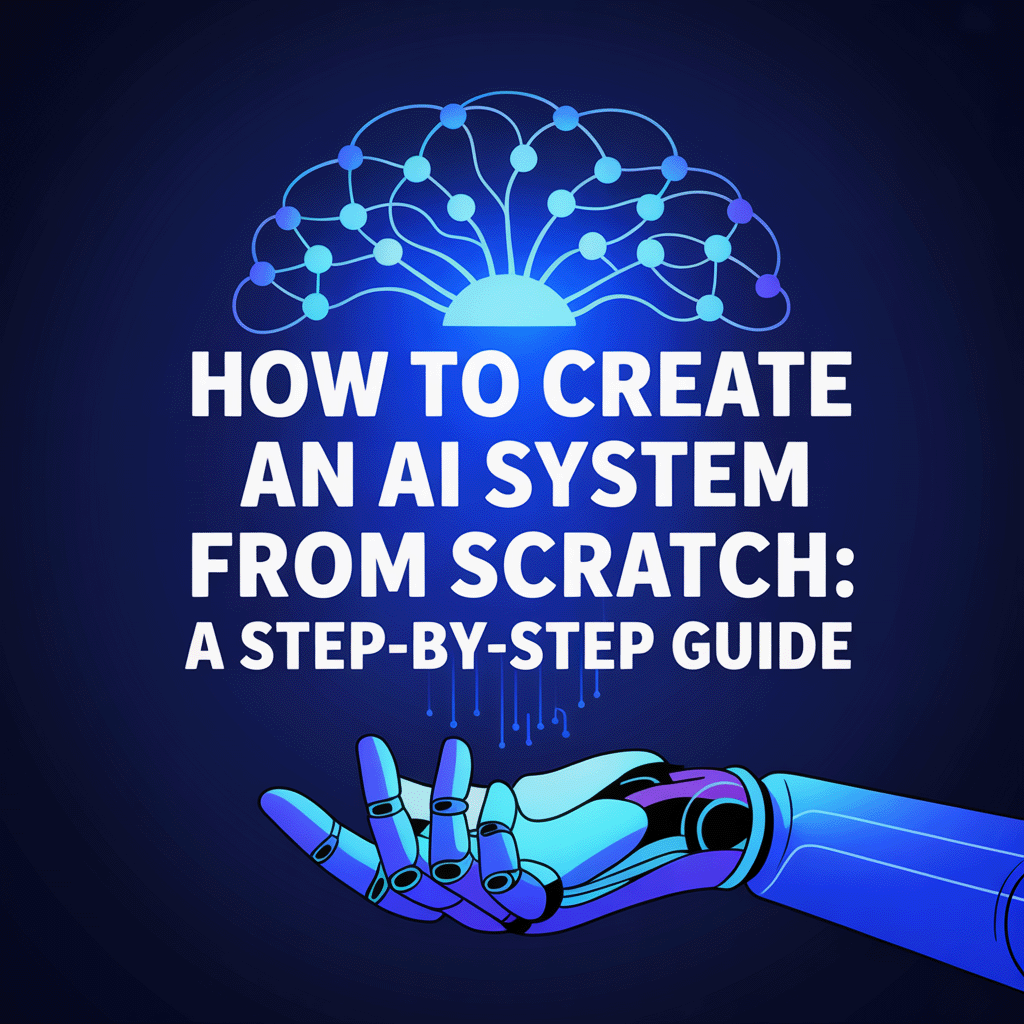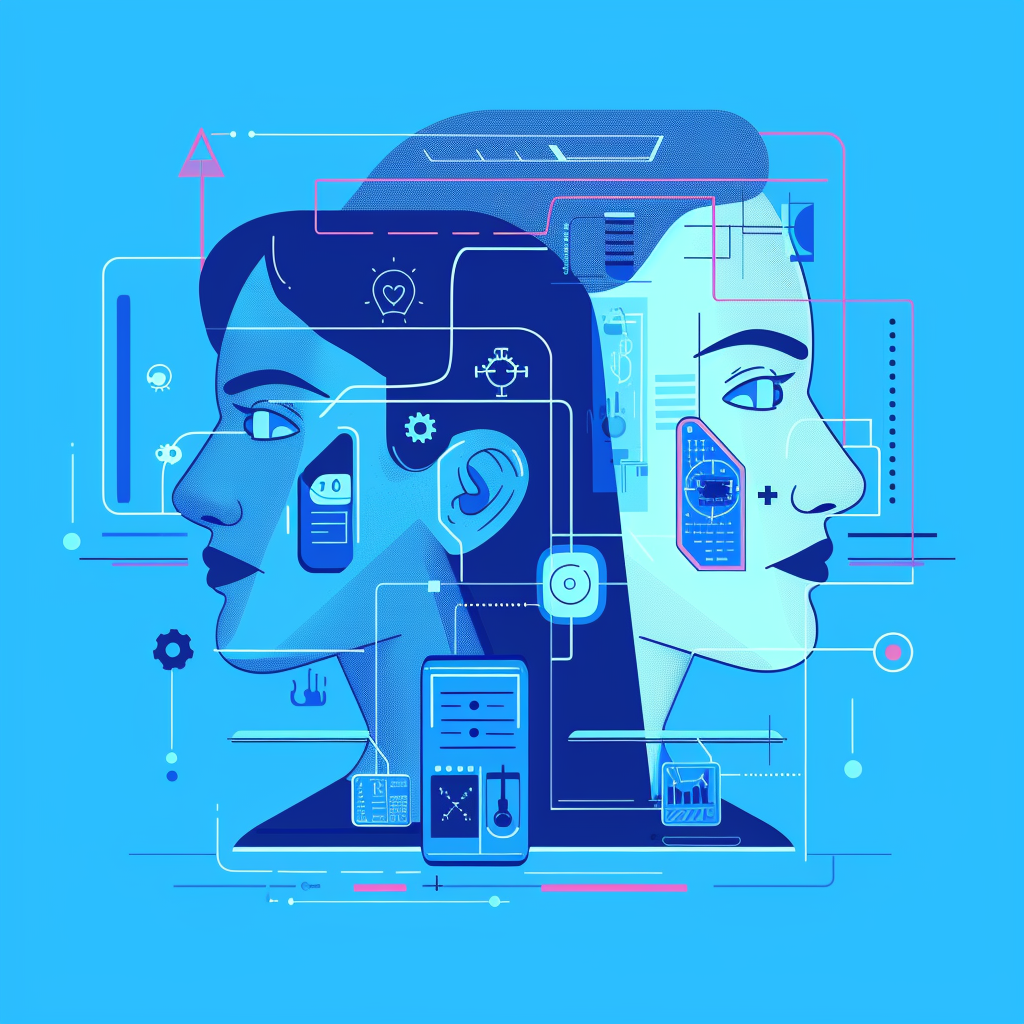AI technology has become a growing trend, addressing business fundamentals and allowing organizations to significantly increase their success rates.
We usually associate Artificial Intelligence and Machine Learning with process automation and assistance for routine tasks, but their capabilities extend beyond that. AI in decision-making is one example: knowing how to use AI to the fullest is the key to making the right business decisions and expanding faster than the closest competitors.
In this article, we will clarify the use of Artificial Intelligence in decision-making and explore how your business can evolve with the help of this new technology.

The Concept and Importance of Artificial Intelligence in Decision-Making
What’s AI? It is a machine’s ability to replicate human learning and cognitive functions. The technology aims to solve problems and make decisions without humans or the errors they make. If well-taught, machines become intelligent bots that help to automate basic repetitive tasks.
What’s AI decision-making? It is the flow where data processing is performed wholly or partially by an AI platform. The human factor is excluded: a program or tool measures and crunches data, performs complex analysis, spots trends, and thus helps in making accurate predictions and decisions. In fact, AI instruments currently offer the top three decision-making degrees:
- Decision support: This degree encompasses predictive, diagnostic, and/or descriptive analytics that humans can rely on in their decision-making. This approach is a combination of artificial and human intelligence rather than an exclusive use of AI for decision-making.
- Decision augmentation: This degree incorporates the application of predictive and prescriptive analytics to suggest decision variables. This degree is another synergy of AI and human knowledge that allows us to quickly analyze large data sets and reduce the complexity of the decision-making process.
- Decision automation: This degree depends upon prescriptive and predictive analytics, allowing users to benefit from the speed of analytics, its enormous scalability, and consistency in the making of decisions.
Artificial Intelligence can train itself to develop data collection models that help in real-time prediction-making, recommendations, and categorizations. Overall, it becomes easier to make effective commercial decisions.
How Does AI Help in Decision-Making: Top Benefits
For those who understand how AI works, it’s important to know how exactly Artificial Intelligence helps in decision-making and what benefits it delivers. We’ve prepared a list of five key benefits.
High speed of data processing
AI decision-making software processes and analyzes large sets of data and streamlines decision-making. Consequently, this allows a company to react to shifting market conditions faster and make better decisions within limited timeframes.
Data-driven decisions
According to research published by Bi-Survey, 58% of businesses make regular business decisions based on either their experience or gut feeling. Let’s admit it: The gut feeling has little, if anything, to do with business strategy or growth. Decision-making with AI helps to correctly analyze data, make an informed decision, and get a competitive advantage. AI can take a much better look at the data array than any human being can.

Effective work with complex patterns
Programs based on Artificial Intelligence and ML algorithms can reveal hidden data patterns that are typically left unnoticed by humans. Once complex patterns, trends, and relationships are identified, AI extracts valuable info and delivers it to a business.
Multiple problem-solving
If a single parameter is changed, AI algorithms are flexible in highlighting more than one outcome of a decision. This is a true benefit that, considering current business goals and strategies, allows any team to make an optimal choice from an array of options they have in front of them.
Improved objectiveness
Unlike human beings, AI-based decision-making is free from biases, emotions, and superstitions, which means the use of AI instruments allows an organization to make more objective decisions. Thus, AI tools minimize human errors and increase the occurrence and objectivity of decisions they help to make.
Challenges of Artificial Intelligence for Decision-Making
Despite the benefits of AI decision-making algorithms, there are still some challenges and issues that any business owner should consider before choosing AI as a part of their digital transformation.
-
- The question of transparency of AI tools. The industry still has doubts and concerns regarding how transparent, accurate, or unbiased AI-generated insights are. There is much discussion around the privacy and security issues regarding artificial intelligence and its access to data sets. Researchers, developers, and users keep asking if AI poses enormous risks for businesses and their clients and what protective measures should be implemented.
- The question of age. AI is a relatively recent innovation that hasn’t yet been time-tested. While the world’s most trustworthy governments work on legislation incorporating AI market regulations, users and businesses fear that some tools can be biased if not adequately developed and tested. This idea makes many companies hesitant to become overreliant on AI software.
- The question of budget. Even if an AI tool is well-tested and developed under all regulations and can revolutionize an organization, implementing Artificial Intelligence in business decision-making is a pricey decision. It requires plenty of resources for a company to introduce an advanced technological infrastructure and skilled teams to ensure that AI software meets expectations.
Decision-making AI in Various Industries: A Quick Summary
Most businesses started introducing AI tools at a basic level, relying on GPT-3 for customer feedback analysis, marketing campaigns, or multilingual chatbots. The use cases extended as the technology continued to grow. In 2024, these sectors are making the most of Artificial Intelligence decision-making.
Banking & finance
Advisory companies are at the forefront of incorporating AI decision-making tools. They develop wealth management platforms supported by intelligent decision-making models. Based on a customer’s financial goal, these models suggest several winning strategies previously verified by human consultants. As of today, Morgan Stanley’s platform is the brightest AI decision-making example. HSBC is another market leader, offering AI-powered US Equity Indexes with a 3-step flow for intelligent investing.
Healthcare
The industry’s boom encompasses the design and development of data analysis and decision-making platforms like Enlitic Curie or similar (Synapsica, Infor, Abacus Insights, RedBrick AI, HeartLab, Genomenon, Insta Health Solutions, Gesund.ai, Altis Labs, etc.) that are a synergy of AI and human doctors’ capabilities. These intelligent products allow different medical practitioners to analyze medical imaging reports faster, suggest the correct diagnosis, and even prioritize cases for medical outcome improvement.
Retail
Retailers and merchants apply decision-making Artificial Intelligence instruments to define specific categories of goods in demand based on external factors, trends, and customer demands. AI software often helps retail companies incorporate better pricing decisions and tailor their pricing policies according to market conditions and client expectations. Together, this allows the optimization of supply chains and the improvement of company revenue.

Environment
We know little about environmental issues, even with most data in hand. The thing is, analyzing ever-changing data flows and making reliable predictions is complicated unless Artificial Intelligence and human decision-making work hand in hand. After analyzing huge data sets on ecology issues, climate changes, and natural disasters, AI tools can suggest risk management steps, options for response, or multiple mitigation strategies. For example, a smart farming application can help manage agricultural practices in changing climates. Eventually, an artificial mind can help humankind survive.
Energy
Modern AI-based software helps users predict their expenses, predict energy use (especially in the case of solar energy generation), optimize battery capacity, and thus better manage their energy consumption. For large private and national energy providers, AI tools are helpful as a part of custom-made business analytics platforms. The latter are now gaining recognition in the Nordics. Such platforms help to gather energy data from different sources, structure and analyze it, and generate reports helpful for optimized decision-making.
Artificial Intelligence Decision-Making Examples In Business
- Van Caem Klerks is using AI-driven instruments to boost its decision-making processes. They came up with this solution after they saw how slow and error-prone their trading solutions were. Having chosen the right instrument, Van Caem Klerks fed their AI with data volumes that included competitor analysis, market trends, and customer preferences. They employed ML algorithms, allowing their AI-based software to learn from their past decisions. Eventually, this approach totally transformed their trading.
- Netflix is doing an impressive job leveraging user data to suggest custom recommendations, delighting users and matching their individual tastes. For this, they harness every click, every replay, and every pause, allowing their inbuilt AI algorithms to analyze them, thus enhancing user experience and resulting in customer retention.
- Amazon has incorporated a powerful AI recommendation instrument that analyzes browsing behavior, demographic data, and purchasing history to predict and suggest relevant goods. In return, AI-assisted decision-making has helped Amazon boost customer satisfaction and loyalty and increase monthly sales.
- Nike started using generative AI when working on new shoe designs. For this, they feed their AI models with modern design inspirations, customers’ color preferences, performance metrics, and foot morphology data. This allows AI to create unique shoe designs to match everyone’s tastes and requirements.
- Spotify has chosen AI instruments for their platform to manage custom-made playlists for platform users. Their AI algorithms for decision-making analyze users’ listening habits and preferences and recommend songs and artists to listen to. As with Netflix, this approach helps strengthen user engagement and loyalty.
- Associated Press confessed that the introduction of digital content has transformed the way they engage with their readers. So, they introduced generative AI to produce automated news articles and create competitive content. Their AI-driven instruments analyze data sources and quickly generate new stories, covering a broad spectrum of topics.

How to Integrate AI Decision-Making into Your Business?
The examples of AI decision-making are inspiring, especially when big market players like Netflix, Nike, and Amazon manage to gain the most of the new technology. But how can you do the same?
We suggest you consider the following five steps that have proved their efficiency:
Start small
When taking a management role, you see numerous areas where AI planning and decision-making can potentially work. But it’s crucial to take small steps. To define the most troublesome area, try to answer the following questions:
- Which of your company’s departments deals with the largest data flow?
- Where does your team take the most time to decide, and how effective are these decisions eventually?
- What results would you prefer to see after decisions are made?
- What issues are the most pressing across the company?
- What barriers prevent your team from success?
Know your choices
The question of budgeting and potential employment needs is always on the surface, and it’s conclusive when you decide on your next option:
- Buying a ready-made AI-based instrument that has a history of solving similar issues.
- Hiring a team with skills and experience in designing and building custom AI instruments.
- Motivating your internal IT team to build the software in-house with the possibility of reselling it as a white-label solution.
Get ready with data sets
Whatever your previous choice is, when having an AI tool aboard, you need to start feeding its models and algorithms with sets of data that it will learn from. Together with your team, go through data collection, sorting, and clearing. The latter step includes checking spelling, abbreviation analysis (formal and informal), removing tags, etc.
Feed data sets in small portions
Don’t wait for a miracle if you feed all the collected data into your AI tool at once. We recommend beginning with one or two sets of data and tracking the flow. This approach will leave AI more time for learning and help your company eliminate organizational risks. After feeding the first set successfully into the AI, expand your efforts.
Monitor results
Measure your team’s achievements after the implementation of AI insights for decision-making. Has your web platform started to perform better? Did your marketing strategy bring more leads? Have you improved business-customer relationships? Always check sales numbers, the ratio of negative reviews to positive ones, and other business metrics to see the benefits of AI and places for improvement.
Bottom Line
The role of artificial intelligence in decision-making has not yet been fully investigated as the whole concept is still new. But even now, with the little research data available, it’s clear that AI will continue growing and expanding into all business branches, making it easier for leaders to manage teams, make the right decisions, automate tasks, and deliver more than one decision option.
If you are on your way to modernization and growth, consider using Artificial Intelligence in business decision-making. We’ll help you to implement AI tools pain-free. Use our contact form, and we’ll get in touch with you to develop something big.




